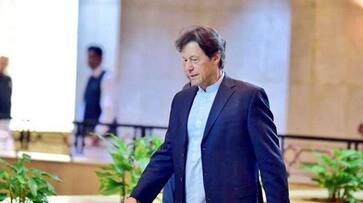Not many people in the country seem to realise or recall the events of those days when Jihadist forces, with the active connivance of Pakistan, and also sly support from the locals, went about eliminating the Kashmiri Pandits from the state.
"Muslim militants directed a systematic campaign of assassinations and intimidation against Kashmiri Pandits, as the area's Hindu Brahmins were known, and most of them were forced out of Kashmir... (T)he Pandits' story is one of the tragic and often overlooked footnotes of a conflict that has claimed perhaps 60,000 lives."
These are the chilling words of Amy Waldman, The New York Times correspondent while reporting in 2003 about yet another massacre of Kashmiri Pandits who had continued living in Kashmir. In that particular incident, 24 Pandits --- out of the 52 living in a village -- were murdered, including 11 women and 2 children.
These poignant lines and sorrow-filled incidents came rushing to mind after reading the tweets of Pakistan Prime Minister Imran Khan superciliously talking of "ethnic cleansing and genocide" in Jammu and Kashmir now.
What happened in the summer of 1989 and continued in sad episodic events from time to time well into the 2000s are what ethnic cleansing is --- the systematic elimination of Kashmiri Pandits from Jammu and Kashmir.
Unfortunately, not many people in the country seem to realise or recall the events of those days when Jihadist forces, with the active connivance of Pakistan, and also sly support from the locals, went about eliminating the non-Muslims from the state.
"It was one of the most horrendous chapters in the modern history of this country," says Sanjay Kaul, a Kashmiri Pandit, whose family was one among the many driven out from the state. Sanjay Kaul recalls those days of trauma when militants and radical religious forces vowed to drive out or extinguish the 'kafirs'.
"They set out Islamise the entire state. They threatened the non-believers to convert or else scoot from the place. Those who defied them paid with their lives. The radicals openly said that their constitution was their religious book."
Even the local media became allies of the militants and as newspapers became the loudspeakers that echoed the chilling messages of the extremists. In the book "A Long Dream of Home: The persecution, exile and exodus of Kashmiri Pandits", Siddhartha Gigoo and Varad Sharma, give a detailed account of how the media willingly coopted themselves into the plans of the Muslim militants who were propped from Pakistan.
For instance, they write, "on January 4, 1990, Aftab, a local Urdu daily publishes a press release from Hizb-ul-Mujahideen to wage jihad for Jammu and Kashmir's secession from India and accession to Pakistan."
On April 14, 1990, another local daily Al Safa, runs the press release from Hizb-ul-Mujahideen warning all non-Muslims to leave the state in 36 hours or face death.
All these cataclysmic events forced Kashmiri Pandits, numbering around 5 lakhs, to flee from Jammu and Kashmir and settle in New Delhi and other places. And sadly of course, around 60,000 of them were brutally killed over time.
Sanjay Kaul recalls that many families that had chosen to stay were terrorised, the head of the family brutalised, women raped, children shot at from point blank. “All kinds of atrocities were perpetrated on us. The rest of India looked on as mute spectators. The government of the day could do nothing because their writ did not run in Kashmir. It was as simple as that."
The locals willingly ceded space to the militants sent from across the border. In 1990, the ISI was said to have operated around 30 camps in Jammu and Kashmir. By the 2000s, the number had escalated to around 128 camps with 1000 active militants enlisted with them.
Sanjay Kaul's sister Pooja has a wry smile when talking about the reactions in social media platforms on which Left liberals are crying themselves hoarse about the "killing of democracy" in Kashmir now following the abrogation of Article 370. "There was no social media in the 90s. But there was not even a token protest from the Left liberals for the inhuman plight that the Pandits had to endure. The liberals are never driven by the desire to safeguard democratic values. They are just anti-Hindu," she says without pulling her punches.
"Now when there is an attempt to resettle the Pandits back where they belonged to there is a hue and cry and it is being termed as an invasion from outsiders. Imran Khan says it is a bid to change the demography of the state. Irony just jumped off from the Himalayan cliffs," she adds.
The government has been heavy-handed in Kashmir, in that sense it is a blot on democracy. But democracy is no worse than it was when a part of the history was wilfully erased and one set of people thrown out of the state while the rest of the country looked on in casual indifference, she says.
Christine Fair in the book "Fighting to the End: The Pakistan Army's Way of War" says "Pakistan has supported an array of Islamist militant proxies that operate in Kashmir and throughout India. Too often the moral support Pakistan offered Kashmir was terrorism."
This being the historic reality, for Imran Khan to make the claims he has made is callously unfortunate. And Indian liberals should also know better.
Last Updated Aug 20, 2019, 7:55 PM IST









![Salman Khan sets stage on fire for Anant Ambani, Radhika Merchant pre-wedding festivities [WATCH] ATG](https://static-gi.asianetnews.com/images/01hr1hh8y86gvb4kbqgnyhc0w0/whatsapp-image-2024-03-03-at-12-24-37-pm_100x60xt.jpg)
![Pregnant Deepika Padukone dances with Ranveer Singh at Anant Ambani, Radhika Merchant pre-wedding bash [WATCH] ATG](https://static-gi.asianetnews.com/images/01hr1ffyd3nzqzgm6ba0k87vr8/whatsapp-image-2024-03-03-at-11-45-35-am_100x60xt.jpg)


